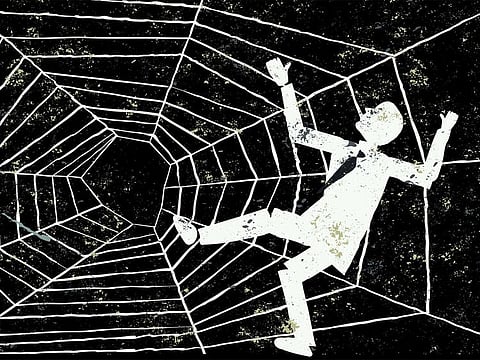Europe seems to have caught an Arab malaise
Germany’s push to cut off Nord Stream 2 pipeline project smacks of pure politics

Although the relationship between economics and politics is complex in its linkage, wisdom requires minimizing the negatives of this equation. Unfortunately, reality has taken another turn, as political tensions contribute to the obstruction of more joint venture development projects that would be beneficial to all involved.
The closest example of this is the accumulated roster of collaborative projects that have remained shelved for more than 70 years, although they were approved by the Arab League. Until today, none of these projects have seen the light, although some initiatives, such as the Pan-Arab Free Trade Agreement, could have brought about gains for all and harm to none.
This issue is not limited to developing countries whose dealings are inevitably dominated by political aspects, but also include those developed and supposedly pragmatic nations. For example, Nord Stream 2, one of the most important infrastructure projects to transport natural gas from Russia to Germany, has been put on hold, even though it would have brought about significant advantages to Europe as a whole.
A pipeline under ‘attack’
Although there are other pipelines from Russia to the EU countries running through some of the countries, Nord Stream 2, most parts are already complete, is the first direct pipeline running from Russia to Germany through the Baltic Sea. In fact, economics and politics are interlinked - and yet, clash - strongly.
Economically, Washington is pressurizing to stop the project on the pretext of reducing Berlin’s reliance on Russian gas. However, the fact is that the US has turned into one of the world’s largest natural gas exporters during the past few years, thanks to shale.
The US is thus looking for large consumer markets such as the Germany’s. At first, Berlin did not respond to Washington’s pressure, but the start of the withdrawal of part of US troops from Germany, has forced Berlin to recalculate.
It was not difficult for Germany to find a reason to stop the project, as it came across an ideal reason after the poisoning of Russian opposition leader Alexei Navalny, who was rushed to Germany for treatment. The government and the opposition were united enough to stop Nord Stream 2 and impose sanctions on Russia.
Don’t rush to judge
The issue has gone beyond that to a point where Norbert Rutgen, a potential candidate to succeed German Chancellor Angela Merkel, could halt Russian gas supplies to Germany and Europe. Definitely, poisoning Navalny is a punishable heinous act regardless of who committed it, but at the same time it is unwise to harm the interests of countries and its peoples just because of this attempt.
If the world’s criminal acts are dealt with this way, this will severely cost global economic and trade cooperation, since there are options that can be adopted to punish suspects by referring them to judiciary and thus be held responsible for their acts. This can be learnt from the case of the killers of former Lebanese prime minister Rafik Hariri who were tried and convicted with no countries imposing any sanctions on Lebanon even after the conviction.
Sheer politics
This simply means that there are political calculations behind the suspension of Nord Stream 2, as it seems that the contagion of the Arab League has moved to Europe. This is at once a sad and funny comparison, when ideally, European pragmatism should fid a way into Arab countries and not the other way around.
Reducing the severity of the sacred link between economics and politics is extremely difficult, especially since it requires enormous courage to take difficult decisions. This is because of the challenges it will face due to the decades of conflicts, particularly during the “Cold War” that followed the Second World War.
Within these bold changes, the Middle East is witnessing unprecedented forms of economic and technological cooperation by overcoming complex barriers. This will bring significant gains to all countries participating in the process of change, regardless of their varying positions.
Interests and pragmatism may be an alternative to the constraints of the interdependence between economics and politics, and this in itself is a shift with strategic dimensions.
- Mohammed Al Asoomi is a specialist in energy and Gulf economic affairs









